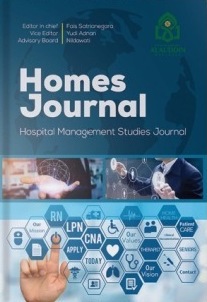RELATIONSHIP KNOWLEDGE AND COMMUNITY BEHAVIOR IN APPLYING SOCIAL DISTANCE AS ONE OF THE COVID-19 PREVENTION MEASURES.
Abstract
Background:Covid-19 can spread from person to person people through splashes from the nose or mouth which comes out when people who contract Covid-19 cough or exhale. People most at risk contracting this disease is a person who is in close contact with Covid-19 patients including those who treat.
Objective:Covid-19 has been declared a pandemic world by WHO (WHO, 2020). Nationally it has been specified status of disaster emergency outbreak of disease due to Coronavirus in Indonesia.
Method:The design of this study is a cross-sectional study with non-sampling techniques probability sampling is purposive sampling. Sample in this study, there were 50 people.
Result: the results of the study showed that many respondents have a good knowledge category 44 people, and have positive behavior that's as many as 40 people. Next, the results of the analysis using fisher's exact test obtained results p = 0.000 (< 0.05) which means there is a relationship between knowledge and behavior of the community in applying social distance as a precautionary measure Covid-19.
Conclusion:From the results of the study it can be concluded that there is a relationship between knowledge and community behavior in applying social distance as one of the Covid-19 prevention measures in Bawalipu VillageReferences
Donsu, J. D. T. (2017). Psikologi Keperawatan. Pustaka Baru.
Ferreira, G. and Pereira, M. G. (2017). Physical activity: The importance of the extended theory of planned behavior, in type 2 Diabetes patients. Journal of health psychology, 22(10), 1312–1321. doi: 10.1177/1359105315626787
Jannuzzi, F. F. et al. (2020). Psychosocial determinants of adherence to oral antidiabetic medication among people with type 2 diabetes. Journal of clinical nursing, 29 (5–6), 909– 921. doi: 10.1111/jocn.15149.
Kemendagri. (2020). Pedoman Manajemen Bagi Pemerintah Daerah Dalam Penanganan COVID-19 dan Dampaknya..
Kemenkes RI. (2020a). Pedoman Pencegahan dan Pengendalian Coronavirus Disease (COVID-19). Germas.
Kemenkes RI. (2020b). Petunjuk Teknis Pelayanan Puskesmas Pada Masa Pandemi Covid-19. In kemenkes RI.
Liu, L. et al. (2016). Use of a knowledgeattitude-behaviour education programme for Chinese adults undergoing maintenance haemodialysis: Randomized controlled trial. The Journal of international medical research, 44(3), 557–568. doi:10.1177/0300060515604980.
Melnick, H., & Darling-Hammond, L. (2020). Reopening Schools in the Context of COVID-19: Health and Safety Guidelines From Other Countries. Learning Policy Institute, 1-13
Mona, N. (2020). Konsep Isolasi Dalam Jaringan Sosial Untuk Meminimalisasi Efek Contagious (Kasus Penyebaran Virus Corona Di Indonesia). Jurnal Sosial Humaniora Terapan, 2(2), 117-125. https://doi.org/10.7454/jsht.v2i2.86
Mujiburrahman M, Riyadi, M. E., & Ningsih, M. U. (2020). Hubungan Pengetahuan dengan perilaku pencegahan COVID 19 di Masyarakat. Jurnal Keperawatan Terpadu, 2 (2), 70-77. https://doi.org/10.32807/jkt.v2i2.85
Novita, N. W., Yuliastuti, C., & Narsih, S. (2018). Tingkat Pengetahuan Tentang Tb Paru Mempengaruhi Penggunaan Masker Di Ruang Paru Rumkital dr. Ramelan Surabaya. Journal of Health Sciences, 7(1), 46-63. https://doi.org/10.33086/jhs.v7i1.486.
Nilsen, P., Seing, I., Ericsson, C. et al. (2020). Implementing social distancing policy measures in the battle against the coronavirus: protocol of a comparative study of Denmark and Sweden. Implement Sci Commun 1 (77), 1-10. https://doi.org/10.1186/s43058-020-00065-x
Rohita, R. (2020). Pengenalan Covid-19 pada Anak Usia Prasekolah: Analisis pada Pelaksanaan Peran Orangtua di Rumah. Jurnal Obsesi : Jurnal Pendidikan Anak Usia Dini, 5(1), 315-326. https://doi.org/10.31004/obsesi.v5i1.528
Shewasinad Yehualashet S, Asefa KK, Mekonnen AG, Gemeda BN, Shiferaw WS, Aynalem YA, et al. (2021) Predictors of adherence to COVID-19 prevention measure among communities in North Shoa Zone, Ethiopia based on health belief model: A cross-sectional study. PLoS ONE 16(1), 1- 16. e0246006.https://doi.org/10.1371/journal.pone.024600
Yanti B, et all. (2020). Community Knowledge, Attitudes, And Behavior Towards Social Distancing Policy As A Means Of Preventing Transmission Of Covid-19 In Indonesia. Jurnal Administrasi Kesehatan Indonesia, 8 (1), 4-14. http://dx.doi.org/10.20473/jaki.v8i0.2020.4-14


